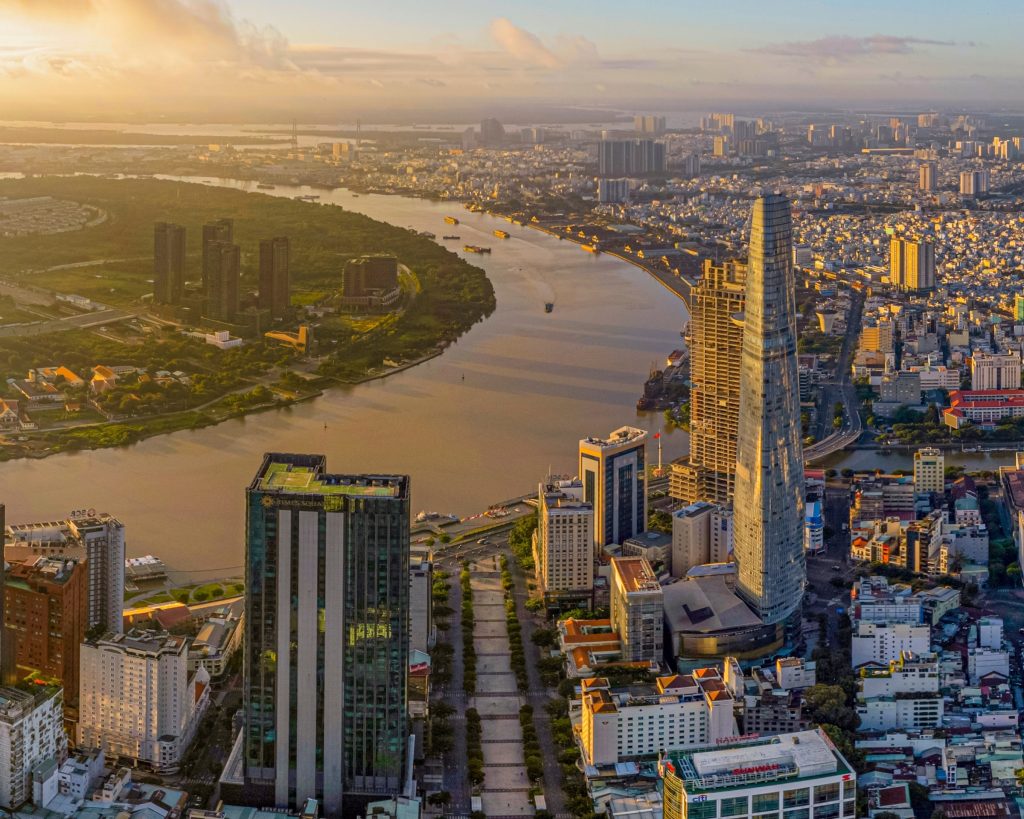VIETNAM REAL ESTATE MARKET IN 2024 SHOWS SIGNS OF RECOVERY
A significant portion of individuals in Vietnam’s real estate sector are optimistic about the market’s recovery in the latter half of 2024, as revealed by Vietnam Report’s recent survey. Foreign investors from Japan, Singapore, or Korea who are presently interested in the nation’s real estate sector are willing to collaborate on an investment if a project has a solid legal foundation.
Corporations are expecting a favorable trajectory for their operational activities in the year 2024. They are optimistic about the gradual economic recovery, lower interest rates, and the successful implementation of digital transformation in their management and operations. The Land Law, Housing Law, and Law on Real Estate Business, which were recently approved by The National Assembly in early 2024 and will come into effect in 2025, are expected to enhance the situation for Overseas Vietnamese regarding property ownership and transactions.

The report emphasized the positive factors that are contributing to the success of the office leasing and industrial real estate segments. These factors include the strategic geographical location, significant public investment in infrastructure, the influx of FDI resulting from recently signed free trade agreements, the implementation of the “China+1” strategy, a stable economic and political environment, and a competitive advantage due to lower industrial land prices compared to neighboring countries.
As of 2023, seven industrial zones have been successfully developed, while an additional 13 are now under construction. Currently, there have been 413 industrial zones established, covering over 87,700 hectares, with an average occupancy rate of 73%. The rental prices in different industrial zones around Vietnam are still increasing. As an illustration, the current rates in Quang Minh Industrial Zone, located in Hanoi Capital City, are VND 65,000 per sqm. The rates in Dinh Tram, Song Khe, Noi Hoang, Quang Chau, Van Trung, Chau Minh Industrial Zones in Bac Giang Province are VND 50,000 per sqm. Meanwhile, in Song Than Industrial Zone located in Binh Duong Province and Tien Thanh Industrial Zone situated in Dong Xoai City, Binh Phuoc Province, the costs are significantly higher, reaching VND 133,000 per sqm.

The real estate sector has faced difficulties in recent years, but there are positive indications of improvement in the first quarter of the year. According to market analysis, there are positive indicators that suggest Ho Chi Minh City will experience a recovery in the second half of the year. These signs include an increase in foreign direct investment, growing consumer demand, and ongoing infrastructure development. Another aspect to consider is the various policies put in place by the city government regarding legal matters and interest rates. These policies have had a positive impact on liquidity and the progress of project implementation.
Based on a report from the Ho Chi Minh City Real Estate Association (HoREA), it has been noted that at the start of this year, around 30% of the over 148 projects that were dealing with legal complications in the city have been successfully resolved, all thanks to the diligent work of authorized agencies at both the central and city levels.
Meanwhile, the Metro Line No.1 (Ben Thanh – Suoi Tien) in Ho Chi Minh City is anticipated to begin commercial operation in October this year. The most populous locality and largest financial center in Vietnam is also expediting the process of constructing three additional metro lines, which will require a significant capital investment of over US$5 billion. These new lines will complement the existing Metro lines No.1 and No.2, further upgrading the city’s transportation infrastructure.

As an analogy to the situation in Ho Chi Minh City, analysts predict that upscale units will soon predominate the Hanoi apartment market, while the supply of mid-priced and affordable units will diminish. The western and eastern regions of Hanoi are expected to account for 90% of the 16,000-18,000 new apartments introduced in 2024. Local buyers persistently favor properties that fulfill housing requirements and legal assurance, generate cash flows, have high liquidity and offer stability for those who look to accumulate assets.
Throughout a span of 15 years, Hanoi Capital City has witnessed remarkable boosts to its urban infrastructure in the western districts due to the extension of its administrative boundary. The Thang Long Avenue in Hanoi was celebrated as a symbol of progress in the country when it was opened in 2010, coinciding with the significant 1,000th anniversary of the capital city. The 30-km road has been developed with great importance due to its strategic location as a gateway to the west of Hanoi. It stretches from the metropolis Cau Giay and Nam Tu Liem Districts to Hoai Duc and Thach That. With the construction of Hoa Lac Hi-tech Park, multiple new industrial parks, and high-rise apartments, the rural areas are undergoing a transformation towards a more modern appearance.
As part of its future plans, Hanoi is set to create two new urban areas in the western portion of the Red River (Hoa Lac and Xuan Mai) and the northern portion (Dong Anh, Me Linh, and Soc Son) by 2045. With the national economic corridor linked to the Nhat Tan-Noi Bai and the Noi Bai International Airport, the northern city is set to become a thriving hub for international integration and service.

In addition to the establishment of the Special Task Force by the Prime Minister in 2023, the Government has issued 22 directives and guidelines to support and implement solutions aimed at addressing challenges in the real estate sector.
The Land Law, Housing Law, and Law on Real Estate Business establish a standardized framework for addressing matters concerning land, housing, and real estate. This framework guarantees that individuals with Vietnamese nationality who are living abroad have the same rights as Vietnamese citizens residing within the country when it comes to property ownership and trading. By doing so, the laws align with the country’s policy of considering overseas Vietnamese as an integral part of the nation.
According to the recently implemented Land Law, Vietnamese citizens living abroad are entitled to the same land rights as their fellow citizens residing within the country. These rights extend beyond residential land and encompass a wide range of land-related privileges. Individuals have the freedom to construct residential properties and participate in construction ventures for various purposes such as selling, leasing, or lease-purchasing. They also have the opportunity to invest in the development of technical infrastructure within real estate projects, including the transfer, lease, and sublease of land rights associated with such infrastructure.
Similar to 2022, over US$19 billion in remittances entered Vietnam last year. There will be a projected 20% increase in remittances in 2024 compared to 2023. Around 25% of the roughly $10 billion in remittances flowing to Vietnam annually since 2012 go toward real estate investments. In 2004, there were roughly 2.7 million Vietnamese citizens living overseas. Today, that number has tripled to about seven million people spread throughout 109 nations and territories. The majority of Vietnamese expats (about 80%) reside in wealthy nations like the United States, Australia, Canada, and France. A smaller percentage (about 500,000) either study or work abroad through labor export programs – Viet Nam News, HanoiTimes, VietNamNet.
For inquiries on global property sales, residential leasing and asset management services in Vietnam, contact Arcadia Consulting Vietnam at rs@arcadia-consult.com.vn.

